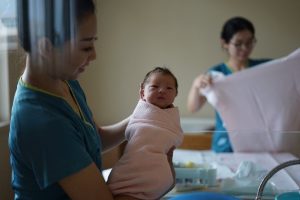
© unsplash.com
The implementation of developmentally supportive care can directly impact the health outcome of preterm babies. A study evaluated South Korean NICU nurses’ experience and perception regarding this approach. Of the 160 participants, almost half could not provide adequate developmentally supportive care, and all nurses indicated the need for education on the matter.
Preterm birth rates have increased in South Korea during the last years, and management and care provision has become a significant healthcare concern. Essential aspects of preterm care include focusing on factors such as a healing environment, partnering with family, protecting the skin, optimising nutrition, and minimising stress and pain for the baby. Furthermore, safeguarding sleep and avoiding unpleasant stimuli also helps to prevent complications from preterm birth and promote optimal growth and development. This approach to preterm health is known as developmentally supportive care and is believed to be key for the infant’s survival.
In South Korea, models like the Newborn Individualized Developmental Care and Assessment Program (NIDCAP) are in the early stages of implementation. Nevertheless, the level of knowledge among South Korean NICU nurses regarding developmentally supportive care is still low. Having this in mind, a group of researchers designed a cross-sectional descriptive study to assess NICU nurses’ knowledge, importance, perception (including attitudes, perceived behavioural control, subjective norms, and intentions), and competence concerning developmentally supportive care. Participants of the study were novice nurses with less than three years of experience, competent nurses with three to six years of experience, and skilled nurses with more than six years of experience, all of which worked in a Level III or IV NICU of university hospitals.
It was found that almost half of the participating nurses believed they could not provide adequate developmentally supportive care. The reasons they mentioned were lack of knowledge, lack of time, inadequate working conditions, and lack of skills. Furthermore, almost all nurses emphasised the need for education and training. Still, more than 80 percent of the nurses were educated in developmentally supportive care, however, generally limited to a one-time academic opportunity. Interestingly, there was no significant difference in skilled nurses’ knowledge and their perceived competence compared with novice nurses. However, perceived behavioural control was significantly higher in skilled NICU nurses compared with novice nurses, meaning they recognise they could provide better developmentally supportive care with a better education.
The findings of this South Korean study reflect the need for systematic education programs. Education and training are important to enhance developmentally supportive care competence among NICU nurses and possibly improve the health outcome of preterm babies.
Paper available at: Advances in Neonatal Care
Full list of authors: Han Na Lee, Ji Hyeon Park, Haeryun Cho
DOI: 10.1097/ANC.0000000000000943

